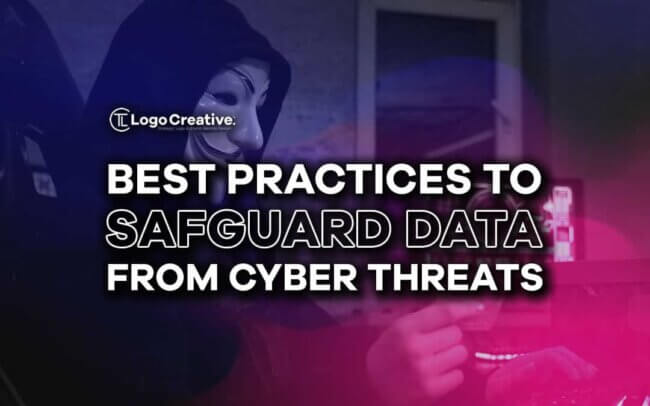Communicating with your clients about design and logo identity is definitely a big part of the creative process. But in the same process, we realize that every detail matters. The logo is, in a way, the first representative of the brand and its essence.
And creating a distinctive brand identity is a big project for every business, no matter the niche, and in the heart of it lies customer relationship management (CRM). We can think of it as collecting every data point and shaping connections to bring your brand to life.
Being able to accept the digital evolution and use CRM as a palette that helps blend the tones of customer interactions can be an opportunity to improve security. There is no artistic journey without being tactful, playing it smart, doing yourself a favour and employing data security in today’s hectic, a bit dangerous, internet exploitive scenery – is a must.
So let’s get into it.
Table of Contents
Understanding the Importance of Data Security in CRM

CRM software, basically serves as a tool for organizations to speedily manage customer interactions and relationships. Its capabilities extend to storing important information, including customer contact details, sales transactions, marketing campaigns, and customer service interactions. The general goal of CRM is to optimize these processes and encourage business growth through increased customer retention and satisfaction rates.
Among the major benefits that come with implementing a CRM system, it also introduces potential risks that must be controlled to secure the collected data. This sensitive information includes personal details like addresses, names, and phone numbers, as well as financial records such as credit card information.
The consequences of a breach involving this type of information can be severe for both the organization and its customers. It may cause reputational damage, a loss of trust from customers leading to missed business opportunities, and, of course, legal complications that could lead to big financial losses.
Hence, ensuring the protection of this critical asset from cyber threats becomes imperative for any business using a CRM system. This is crucial for building and preserving trust with both current and new clients, in addition to guaranteeing adherence to laws like the GDPR and HIPAA.
How to Comply with GDPR?
Data protection regulations exist in this world, and of course, we need to cherish them as they are a cornerstone for businesses. The General Data Protection Regulation (GDPR) was enacted in 2018, and it mandates explicit consent for collecting and storing personal information, emphasizing strong security measures against any kind of cyberhazard.
To ensure compliance, businesses can adopt the following practices:
- Conduct regular data audits to identify vulnerabilities within CRM systems through periodic audits.
- Strengthen access controls with multi-factor authentication for CRM systems by implementing strong user authentication.
- Encrypt data in transit and, at rest, apply encryption to render data unreadable to unauthorized access.
- Staff members should receive training on data protection procedures and how to handle and store sensitive data appropriately.
- Maintain system updates, apply firewalls and antivirus software for enhanced cybersecurity, and update CRM software and systems on a regular basis.
Not only can compliance reduce fines, but it also demonstrates a company’s dedication to strong data protection practices, increasing transparency, credibility and staying competitive.
What is Credential Harvesting and How do you Protect Against it?

Nowadays, it’s not easy to stay up with trends, but some cybersecurity trends are quite easy to understand. For example, being ready to prevent malicious activities like credential harvesting, in which online criminals employ various techniques to acquire private user information like usernames and passwords. This is accomplished through a variety of strategies, including phishing emails, phony websites, and malware that tracks keystrokes.
So, once obtained, these credentials can be used to gain unauthorized access to personal accounts, corporate networks, or sensitive information.
Businesses and individuals should place a high priority on cybersecurity best practices in order to prevent credential harvesting.
Using strong, unique passwords for each account (do not overuse the same one, just because it’s easier to remember it), enabling multi-factor authentication (MFA), and staying observant against phishing attempts are crucial steps. Regularly updating and patching software also helps address vulnerabilities that attackers may exploit to harvest credentials.
The Access Controls your Business need – is Implementing the Strong Ones
One necessary practice for protecting data from cyber dangers is the implementation of solid access controls. Limiting access to sensitive information to only those who need it minimizes the risk of unauthorized access.
On a regular basis, review and alter access permissions based on job roles and responsibilities. This guarantees that individuals have the required access to perform their tasks without unwanted exposure to sensitive data.
Don’t Click on Later – Regularly Update and Patch Software
One of the vital recommendations for strengthening defences against cyber attacks is to keep soft software updated. Updated operating systems, apps, and security software often fix security flaws that hackers may exploit.
This procedure may be integrated with automated updates and patch management systems, which closes the window of opportunity for possible cyberattacks. Organizations considerably increase their resistance to changing cyber threats by upholding a safe and current software environment.
Although it is one of the greatest practices available, it is frequently overlooked and forgotten due to the importance of the moment at hand. In the event of a system failure or cyberattack, this can also be helpful if you are ready and have recent backups. Backup data regularly can save businesses from losing relevant information permanently. It’s also recommended to have multiple copies stored securely in different locations.
Encouraging Employees for a Cyber Resilient Workplace Using CCPA

Source:Photo by William Fortunato : https://www.pexels.com/photo/group-of-multiethnic-coworkers-discussing-startup-project-on-laptops-together-6140676/
In cultivating a sturdy cybersecurity posture, the education and training of employees become foundational elements. This imperative extends beyond general cybersecurity awareness to include specialized expertise, notably in the area of CCPA (California Consumer Privacy Act) compliance software. Elevating the workforce’s proficiency is critical to dealing with the complexities of data protection and privacy regulations.
The general training strategy instills in employees the ability to identify and thwart common cyber threats, developing a heightened sense of vigilance within the organizational culture.
When digging into the specifics of CCPA compliance software, tailored training assumes paramount importance. Employees need to be proficient with the software in order to ensure accurate consent management, efficient data mapping, and timely responses to requests for data access.
This specific training supports data security protocols and guarantees careful obedience to the clear legal requirements outlined by the CCPA.
By putting in place a dual-focus training program that blends general cybersecurity knowledge with specialized knowledge of CCPA compliance software, businesses can enable their employees to actively support the maintenance of the highest standards of data privacy and regulatory compliance.
Using Encryption to Elevate Data Security in CRM Systems
Since CRM systems are extensively used in digital corporate organizations, data security must be a top priority. In this situation, encryption is particularly effective since it provides an extra degree of security by converting data into an incoherent code that can only be accessed with a unique key or password. This approach ensures that sensitive data in the CRM system is unreadable to hostile actors, even in the event of unwanted access.
Encryption is a proactive step that not only improves data protection but also builds consumer trust, complies with regulations, mitigates the effect of possible breaches, and strikes a balance between accessibility and security.
Using strong encryption techniques is essential to guaranteeing CRM systems’ long-term resistance to changing cyberattacks.
Don’t Forget to Monitor and Audit CRM Activity
A proactive approach is formed when regular audits and ongoing monitoring are combined, allowing for the early identification of any irregularities, suspicious activity, or illegal access inside the CRM system. Companies may more quickly identify potential threats and take prompt action to stop data breaches by adopting a proactive approach.
Frequent audits offer insights into the integrity of CRM operations and act as a troubleshooting tool. By using this tactic, companies can strengthen their defenses against cyberattacks, preserve sensitive consumer data, and promote accountability and responsiveness within their workforce.
Embrace and Conquer a Secure Future
It is not at all difficult to envision a time in the future when implementing robust security measures is crucial for establishing relationships, maintaining integrity, and preserving your company’s brand. A CRM serves as the cornerstone of digital interactions, bringing with it strong security.
This is where every touchpoint matters, as your company is making a strategic decision that will lead to a better, more secure future.
Maintaining your confidence in improving cybersecurity procedures is one thing; selecting collaborators, resources, and software to assist you in doing so is quite another. Keep it separate; choose wisely. Remember to be reasonable, mindful, and courteous of both your company and yourself. These are just the essentials, and you already know how to take these actions from the previous article.
Join The Logo Community
We hope you enjoyed this article about Exploring Alternative Approaches to Marketing for Business Success.
If you would like more personal tips, advice, insights, and access to our community threads and other goodies, join us in our community.
You can comment directly on posts, access our community threads, have a discussion and ask questions with our founder Andrew.
If you’re looking to learn more about brand strategy, we highly recommend eRESONAID with our friend and acclaimed brand strategist and author Fabian Geyrhalter, it’s packed full of knowledge and insights you will need to learn to become a brand strategist or apply what you learn within your own business.


